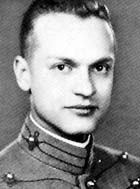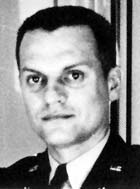Courtesy of his classmates, United States Military Academy
John George Moses Jr.
No. 13134 • 25 February 1920 – 1 February 1979
Died at Walter Reed Army Medical Center, Washington, DC, aged 58 years
Interment: Arlington National Cemetery, Arlington, Virginia
On February 1, 1979, Johnny Moses returned his soul to his creator, after a long illness at Walter Reed Army Medical Center. On the 5th of February, I accompanied my husband to Arlington National Cemetery where Catholic services were held at Fort Myer Chapel.
My husband’s passing caused me infinite pain. As the coffin was borne past me I realized the terrible emptiness that was left with me. The heartbroken feeling of parting with a loved one, before we grow old, where there is still time left to share and to enjoy.
We are never prepared for death even after many thousands of years of the same experience. It always comes as an unwelcome surprise. As the months pass by, I have
found that the only remedy for heartache is to turn to God in faith. I gained the unshakable belief that there is no death, that all life is indivisible, that the here and hereafter are one and that time and eternity are inseparable.
What happens when a man leaves this world? The truth comes by intuition, by reasoning, as I gradually arrived to such an understanding. It did not ward off my sorrow, but filled my heart with peace, for all these convictions are based upon the Bible. “Eye hath not seen nor ear heard, neither have entered into the heart of man, the things which God hath prepared for them that love Him.”
Johnny left an enormous void behind him, for he was a man of humility, knowledge, peace, and compassion. He was a man of great strength of mind, and imbued with the ideal of pride and self-respect. His sense of dignity strengthened his courage; not once did the physical torture overcome his spiritual strength — he never complained, not even to the doctors.
My involvement with art and music brought us to a common ground, as he was a connoisseur of classical music in all his life. His love for animals and plants I dearly shared, but he found his greatest enjoyment in books, in a fine collection of classics.
Johnny also spoke four languages fluently. His hobby of course was football games, especially the home games at West Point. We were married for 32 years.
John G. Moses, Jr., was born in New Britain, Connecticut, to Mary and John Moses. He attended grammar and high school there, also the Connecticut Teachers College in 1938, served in the Connecticut National Guard, and was appointed to the United States Military Academy in 1939 from Connecticut.
His classmates called him “Mo.” He graduated in January 1943. Since we were in a war a decision was made by the Army to speed up the supply of commissioned officers from West Point. Instead of the regular four-year course, the Academy reverted to a three and one-half year course and graduation took place in January.
Johnny was commissioned in the Signal Corps and reported to Fort Monmouth, New Jersey, for branch training and four months as a second lieutenant. Upon completion of this course, he was assigned to the 4th Armored Division training at Desert Center, California.
Early in May, he was promoted to First Lieutenant and served in the 4th Armored Division in Europe during World War II. On 16 November 1945, he was promoted to Captain and in 1948 he returned to the United States where he was assigned as a student to Camp Holabird, Maryland, to the Signal Supply School as of the 1st of April. He remained there until 1951 as student and later as instructor.
An 82-week advanced Signal course followed in Fort Monmouth from where Johnny returned to West Point in 1952 as Post Signal Officer for three years. He was promoted to the rank of Major.
In 1957, he earned his master’s degree in business administration from Harvard University. In 1958, Johnny completed the course at the Command and General Staff College at Fort Leavenworth and was next assigned to Signal Group Ryukyus Island Command, Okinawa, where he was promoted to Lieutenant Colonel. He returned to the United States in 1961 and was assigned to the office of the Chief Signal Officer, and in 1962 was again sent to Fort Monmouth, New Jersey, to Headquarters Electronics Command, from where he joined the Eighth Army Signal Office in Korea in 1964. Upon his return, he retired in 1966. Among others, he received the
Bronze Star Medal.
After retirement, he returned to Fort Monmouth Electronics Command in a civilian capacity as systems engineer; however, due to health, in 1971 he retired from civilian employment too.
There is a terrible emptiness when some one dear to you has been taken away. But the separation is not forever. In God’s plan, in a tomorrow that is now near, you will see your loved one again.
Continue to have faith in the promises of God, lose yourself in the hope that inspires your heart, and enables you to carry on through the darkness of the night while waiting for the joy which, you can be sure, will come in the morning.
Michael Robert Patterson was born in Arlington and is the son of a former officer of the US Army. So it was no wonder that sooner or later his interests drew him to American history and especially to American military history. Many of his articles can be found on renowned portals like the New York Times, Washingtonpost or Wikipedia.
Reviewed by: Michael Howard


